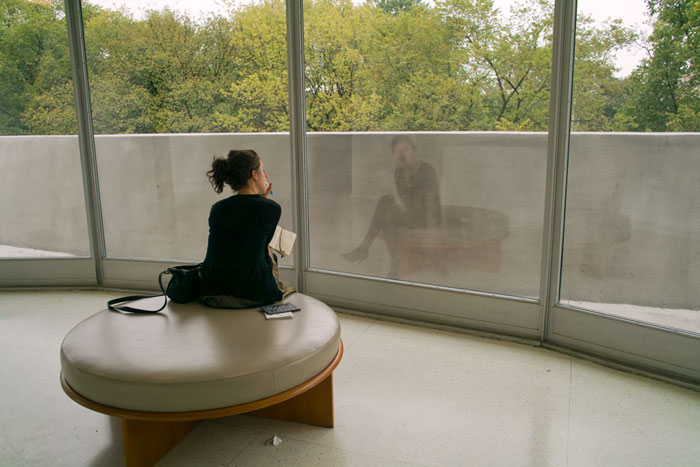Guggenheim Museum lounge — © Brian Rose
A few thoughts on the Rineke Dijkstra retrospective that closes today at the Guggenheim. I’ve seen enough, or rather, I’ve seen too much. I’m not sure whose fault this is: the art market, the art media, or our cultural obsession with celebrity. At some point the person and their work becomes objectified to such an extent that whatever originality there was, whatever spark of discovery was once seized upon, now seems static and neutered.
Part of the problem for me may be the inherently totemic nature of Dijktra’s portraits along with the serial nature of much of her work. They are a bit like the Bechers’ images of building types in their frontal, decontextualized isolation of the subject. Like the Bechers work, however brilliant, I yearn to be set free. To return to the world with all its messiness, it’s complexity, it’s overlapping chaotic craziness, a world to be navigated through, a world comprised of multiple view-points.
I was happy to see Dijkstra’s video piece made in two techno clubs in the 1990s. I hadn’t seen it before, which helped, and I like the slightly less hermetic representation of the infinitely awkward young people thrust before the camera. They are human specimens, momentarily plucked from their environment, still squirming, alive. Am I comfortable with this kind of biology experiment? No. But comfort is, perhaps, beside the point, whether we’re talking about Arbus, Mapplethorpe, Ruff, Dijkstra, or a host of other photographers.
But I can’t look at Dijkstra any more. Maybe it’s my fault, and I will get over it. There was a time I couldn’t listen to Bob Dylan any more, but that passed. Do I care any longer that her portraits look like Botticelli or Dutch masters? No. Everyone from Sherman to Goldin to Wall seem to be obsessed with making photography look more like art–real art–than the recalcitrant stepchild photography has always been. There’s something tiresome going on here, no matter how talented these artist/photographers are.
So, I’ve seen the Dijkstra (mid-career) retrospective–she’s only 53 with lots more to do I’m sure–and have the book. But I’ll be taking a break from this work for a while.
